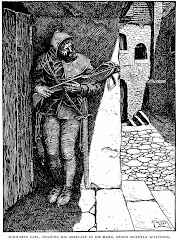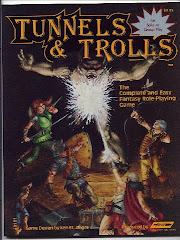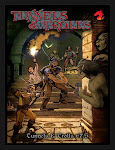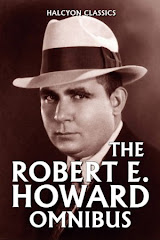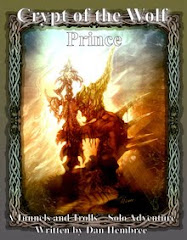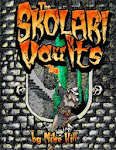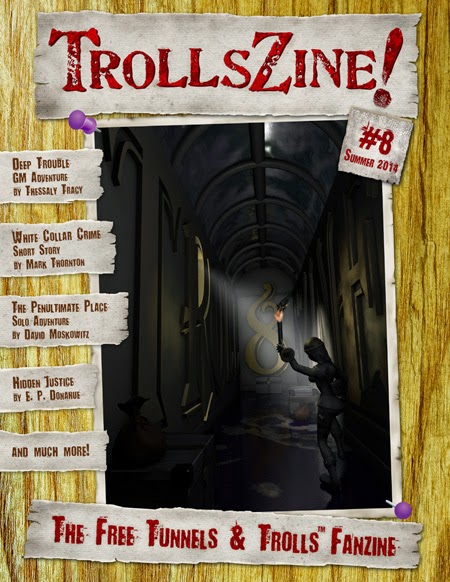Just for fun, I calculated the attributes of Itash the Grim as a member of the other 5th edition kin. Each of these has an interesting effect on the effectiveness of Itash as a Wizard.
Itash the Dwarf
Type: Wizard
Kin: Dwarf
Level: 1
ST 28
IQ 14
LK 14
CON 18
DEX 12
CHR 7
ADDS +18
As I've mentioned previously, dwarves are the most ideal kin for solo adventurers in 5th edition and even more so in earlier editions. Their doubled Strength and Constitution given them a major edge in combat. With his two daggers Itash the Dwarf gets 4D+32 making him capable of taking on a MR50 (6D+25) monster in by himself in hand-to-hand combat with pretty even chances on winning. In addition, as a dwarf Itash can cast several spells without worrying about dropping to negative adds or becoming too weak to wield his weapons.
Itash the Elf
Type: Wizard
Kin: Elf
Level: 1
ST 14
IQ 21
LK 14
CON 6
DEX 18
CHR 20
ADDS +10/+16
As an elf, Itash is a little more fragile, but the boost to IQ and DEX means that he wouldn't need to invest too heavily in these attributes when gaining levels; his current IQ and DEX are already high enough to allow the use of 6th level spells. The DEX boost also makes Itash the Elf deadly with missile weapons.
Itash the Hobbit
Type: Wizard
Kin: Hobbit
Level: 1
ST 7
IQ 14
LK 14
CON 18
DEX 18
CHR 10
ADDS +6/+12
Now we start to see the problem with spells being powered by the Strength attribute. Itash the Hobbit wouldn't be able to cast very many spells. A single Take That You Fiend would render him almost too weak to move. The boosts to CON and DEX do make him rather hearty and dextrous, but he would do far better as a bow-wielding Warrior or Rogue.
Itash the Leprechaun
Type: Wizard
Kin: Leprechaun
Level: 1
ST 7
IQ 21
LK 21
CON 9
DEX 18
CHR 10
ADDS +13/+19
The same problem with Strength occurs with Itash the Leprechaun. Of course that does not mean too much starting out since Leprechauns know no spells when they start. But his high IQ, LK, and DEX do make him formidable especially with ranged weapons. Plus he's still doing more damage in combat than Itash the Human (4D+27 vs 4D+18).
Itash the Fairy
Type: Wizard
Kin: Fairy
Level: 1
ST 4
IQ 14
LK 21
CON 3
DEX 18
CHR 20
ADDS +10/+16
Here's an even bigger problem with using Strength to power spells. Itash the Fairy cannot cast four of the ten starting spells including Take That You Fiend, Oh There It Is, Vorpal Blade, and Oh Go Away. These are by far the most important of the first level spells especially to a solo wizard (IMO). That Wizardry attribute looks even better now. The bonus adds from the boosted LK and DEX still makes Itash and effective fighter using two banks (requiring only 1 ST/DEX each) giving him 4D+16; he's also deadly at a distance. Given these attributes I would not make Itash the Fairy a Wizard; a Rogue would be a better choice here.
There you have it; five alternate views of Itash the Grim. Interestingly, in all cases Itash became a better fighter (i.e. had more personal adds) when played as a kin other than human. This again points out that Wizards can be capable combatants; it's all in the attributes.
Monday, October 17, 2011
Friday, October 7, 2011
Spell Casting Mechanics: Points vs Memory
I am currently running two play-by-post T&T games, one at the Trollbridge and another on Roleplay Online. One aspect of the T&T rules that I have had an issue with while running these games is how tedious and difficult it can sometimes be to keep track of Strength/Wizardry points expended by the spell casters and their eventual, slow recovery. In the T&T rules spell casters recover 1 point of ST/WIZ per 10 minutes spent in non-strenuous activity; this typically means nothing more taxing than walking. Keeping track of all of these points can be tiring to say the least. The alternate way of limiting the power of spell casters and eliminating the 'point cost' method is the 'memory' method. Wizards and similar characters memorize spells at the start of the day and they may only cast that spell once. Once it is cast, the word and instructions for that spell vanish from the wizard's mind.
Instead of choosing one of these options, I've thought of a new house rule for T&T spell casting that simplifies the current 'point' method:
To me this house rule fits in well with T&T's basic KISS strategy. This approach seems to work out in my mind, we'll just have to see how it works in practice.
Instead of choosing one of these options, I've thought of a new house rule for T&T spell casting that simplifies the current 'point' method:
Wizards, Rogues, and Warrior-Wizards may cast a number of spells per day equal to his/her Strength or Wizardry attribute. Each level of spell increases the casting cost by 1 point, so a first level spell costs 1 point, a second level spell costs 2 points, and so on. A day starts after the spell caster gets at least eight hours of uninterrupted rest (no moving, no fighting). Spells that are cast do not vanish from memory and may be cast multiple times. So if you have a WIZ of 15, you could cast Take That You Fiend 15 times in a day as long as you cast no other spell. When using the Strength attribute to power magic (1st-5th editions), Strength is not reduced and personal adds are not lost from casting spells.
Benefit of magic staffs: A magic staff increases the number of ST/WIZ points available to a Wizard each day equal to 1D6 + Wizard level. The die is rolled at the start of each day making the benefit of the staff somewhat unpredictable. Makeshift staffs can only be used once before becoming worthless.
Casting lower level magic: Wizards may cast lower level magic at a cost reduced by an amount equal to Wizard Level minus Spell Level. The base cost is always 1 point. So a 3rd level Wizard can cast first and second level spells at a cost of 1 ST/WIZ each. A 10th level Wizard can cast a 7th level spell at a cost of 4 ST/WIZ.
Powering up spells: A wizard can cast some low level spells at a higher level to greater effect. The spell simply costs a number of ST/WIZ points equal to this effective level. So a third level Take That You Fiend costs 3 points.
To me this house rule fits in well with T&T's basic KISS strategy. This approach seems to work out in my mind, we'll just have to see how it works in practice.
Saturday, October 1, 2011
Hocus Pocus and Magic Staffs
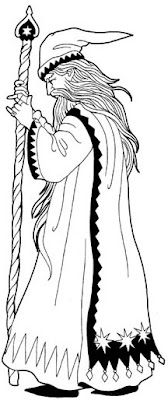 The typical image of a wizard generally includes some kind of magic staff or wand. While this does not fit my view of a delving wizard (especially a lone delving wizard), magic staffs are extremely useful to a Wizard in Tunnels and Trolls. They are one of the major advantages that Wizards have over Rogues in spell-casting. Like most of them, the rules regarding magic staffs have changed over the editions and I have always had questions about them.
The typical image of a wizard generally includes some kind of magic staff or wand. While this does not fit my view of a delving wizard (especially a lone delving wizard), magic staffs are extremely useful to a Wizard in Tunnels and Trolls. They are one of the major advantages that Wizards have over Rogues in spell-casting. Like most of them, the rules regarding magic staffs have changed over the editions and I have always had questions about them.In the 5th and 7th edition rules, a magic staff reduces the cost to cast a spell by the level number of the wizard down to a minimum cost of 1 (Strength or Wizardry). This may not seem like a lot but it can be quite helpful even to a level 1 Wizard.
When selecting a magic staff a Wizard can buy two types from the Wizard's Guild, a staff ordinaire or a staff deluxe. The first is rather common and cheap (100 gp) but will never burn out. The second is pretty costly (5000 gp) and also mysterious. It reduces the cost of casting spells the exact same way that the staff ordinaire does, but it can remember the spells cast through it; so perhaps your shiny new staff has a few things to teach you? Some say that deluxe staffs have demons bound inside them.
Of course the Wizard always has the option of using a basic spell that every Wizard knows, Hocus Pocus, to create a makeshift staff. This requires no money at all, you simply need to find yourself a piece of wood. Here is where my questions begin.
First, the nature of the magic staff (often referred to as a focus) can vary according to the rules and may include "wands, walking sticks, sturdy quarterstaves, or even rings." So now it seems that your staff ordinaire may in fact be a ring or maybe a pendant hanging from a chain and not a 5' length of wood.
But, in 5th edition rules, the description for Hocus Pocus states specifically that it can be used to enchant any piece of WOOD into a makeshift staff. It does not say anything about any other items. So here is where house rules come in. Do you really only allow this spell to be cast on wood, or do you allow other items such as stone, ceramic, or metal? But while the description does say that the spell is cast on a piece of wood it does not say it must be a stick. It could simply be a chunk of wood; or maybe a wooden ring? That has possibilities. This caveat allows both rules to stand as is; Hocus Pocus may be cast on any wooden object.
The chief drawback of the makeshift staff is that it eventually will burn out and crumble to dust. This happens (in 5th edition) once the Wizard has cast a number of Strength points through the staff equal to twice his/her Intelligence. This is where my next question comes in: how do you count the Strength (or Wizardry, Mana, etc.) points cast through the staff? Is it the number of Strength points saved by using the staff or the total number of Strength points used to cast the spell? In other words, if you are a 1st level Wizard and cast Vorpal Blade using your makeshift staff, does that reduce it's Strength pool by 5 (the full cost of the spell) or by 1 (the strength saved by using the staff)? I've seen this rule interpreted both ways. Personally I prefer the latter. This really is not too much of a drawback since you can always find a new item to produce a makeshift staff. Besides, who says that you cannot create 10 or even 20 makeshift staffs the day before you set out to seek fame and fortune? There's no time limit on the enchantment after all. But then in 5th edition the makeshift staff may fail on the first attempt to use it unless you make a Level 1 Saving Roll on Luck. This is all the more reason to invest in increasing your Wizard's Luck attribute when you gain that first level.
At least one of these questions was answered for me in the 7th edition rules, where the spell (now called Hocus Focus) is now described as being able to "enchant ANY non-magical item into a magical focus." So in 7th edition you are not restricted to wood. That certainly increases the usefulness of this spell since according to this rule you could enchant a piece of lint you pull out of your pocket. Also, the chance of the makeshift focus failing on first use is not longer there. Even better. There is also an interesting change where it channels a number of Wizardry points equal to the Wizard's combined Intelligence and Dexterity. The combat effectiveness of the two different types of staffs is also addressed. The staff ordinaire is listed as a 2D weapon while the deluxe staff is listed as a 4D weapon due to the indestructible nature of the material (and the fact that there's a demon trapped inside).
So what does all this mean and why am I writing about magic staffs? Itash the Grim has been missing a magic staff in his adventures, but he really needs both hands free to fight with his daggers. The solution? Itash the Grim is going to get a small knife and make himself a pocket full of wooden rings to use a makeshift "staffs" on his next adventure and keep his hands free for his daggers while casting his spells for less Strength. Time to gear up for one last trip through Buffalo Castle. Take That You Fiend!
Subscribe to:
Posts (Atom)

